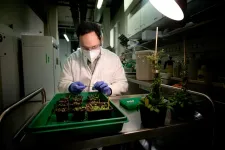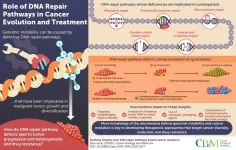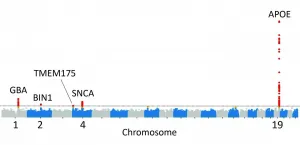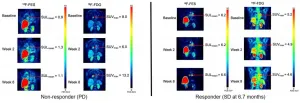Neandertal gene variants both increase and decrease the risk for severe COVID-19
2021-02-16
(Press-News.org) Last year, researchers at Karolinska Institutet in Sweden and the Max Planck Institute for Evolutionary Anthropology in Leipzig, Germany showed that a major genetic risk factor for severe COVID-19 is inherited from Neandertals. Now the same researchers show, in a study published in PNAS, that Neandertals also contributed a protective variant. Half of all people outside Africa carry a Neandertal gene variant that reduces the risk of needing intensive care for COVID-19 by 20 percent.
Some people become seriously ill when infected with SARS-CoV-2 while others get only mild or no symptoms. In addition to risk factors such as advanced age and diabetes, gene variants also make people more or less sensitive to developing severe COVID-19. A major genetic risk factor is located on chromosome 3 and dramatically increases the risk of respiratory failure and even death. Hugo Zeberg and Svante Pääbo at Karolinska Institutet and the Max Planck Institute for Evolutionary Anthropology discovered last year that this risk variant is inherited from Neandertals.
Now the research duo shows that the Neandertals also contributed a protective variant to present-day people. They find that a region on chromosome 12 that reduces the risk of needing intensive care upon infection with the virus by 20 percent is inherited from Neandertals. The genes in this region are called OAS and regulate the activity of an enzyme that breaks down viral genomes, and the Neandertal variant of the enzyme seems to do this more efficiently.
"This shows that our heritage from Neandertals is a double-edged sword when it comes to our response to SARS-CoV-2. They have given us variants that we can both curse and thank them for," says Hugo Zeberg, researcher at the Department of Neuroscience, Karolinska Institutet, and the Max Planck Institute for Evolutionary Anthropology.
The study also shows that the protective variant from Neandertals has increased in frequency since the last Ice Age so that it is now carried by about half of all people outside Africa.
"It is striking that this Neandertal gene variant has become so common in many parts of the world. This suggests that it has been favourable in the past," says Svante Pääbo, director at the Max Planck Institute for Evolutionary Anthropology. "It is also striking that two genetic variants inherited from Neandertals influence COVID-19 outcomes in opposite directions. Their immune system obviously influences us in both positive and negative ways today."
INFORMATION:
The research was funded by the NOMIS Foundation and the Max Planck Society. The authors declare no competing interest.
Publication: "A genomic region associated with protection against severe COVID-19 is inherited from Neandertals". Hugo Zeberg and Svante Pääbo. PNAS, online February 16, 2021, doi: 10.1073/pnas.2026309118.
ELSE PRESS RELEASES FROM THIS DATE:
2021-02-16
How do plants build resilience? An international research team led by the University of Göttingen studied the molecular mechanisms of the plant immune system. They were able to show a connection between a relatively unknown gene and resistance to pathogens. The results of the study were published in the journal The Plant Cell.
Scientists from "PRoTECT" - Plant Responses To Eliminate Critical Threats - investigated the molecular mechanisms of the immune system of a small flowering plant known as thale cress (Arabidopsis thaliana). PRoTECT ...
2021-02-16
The ongoing health disaster of the past 12 months has exposed the crises facing nursing homes in Canada and the United States and the struggles of the staff working in them.
Writing in the Journal of Comparative Policy Analysis: Research and Practice, PhD student Daniel Dickson, his supervisor Patrik Marier, professor of political science, and co-author Robert Henry Cox of the University of South Carolina perform a comparative analysis of those workers' experiences. In it, they look at Quebec (including those at government-run CHSLDs), British Columbia, Washington State and Ohio ...
2021-02-16
Hamilton, ON (February 16, 2021) - A McMaster stem cell research team has made an important early step in developing a new class of therapeutics for patients with a deadly blood cancer.
The team has discovered that for acute myeloid leukemia (AML) patients, there is a dopamine receptor pathway that becomes abnormally activated in the cancer stem cells. This inspired the clinical investigation of a dopamine receptor-inhibiting drug thioridazine as a new therapy for patients, and their focus on adult AML has revealed encouraging results.
AML is a particularly deadly cancer that starts with a DNA mutation in the blood stem cells of the bone marrow that produce too many infection-fighting white blood cells. According ...
2021-02-16
The ongoing fight of science against cancer has made great strides, but cancer cells have not made it easy. The complexity of cancer cells and their adaptive evolutionary nature complicate the search for effective cures. Multiple DNA repair pathways in healthy cells typically work to rectify DNA damages caused by sources within the organism, like spontaneous DNA mutations, or from outside, like ultraviolet radiation.
But what happens when these pathways malfunction? It is known that deficiencies in these pathways increase the instability of the genes, and this causes cancer to develop. Therefore, detailed knowledge of how DNA repair pathways participate in this process is crucial for tracking tumor progression, understanding the emergence of drug ...
2021-02-16
Melanoma is by far the deadliest form of skin cancer, killing more than 7,000 people in the United States in 2019 alone. Early detection of the disease dramatically reduces the risk of death and the costs of treatment, but widespread melanoma screening is not currently feasible. There are about 12,000 practicing dermatologists in the US, and they would each need to see 27,416 patients per year to screen the entire population for suspicious pigmented lesions (SPLs) that can indicate cancer.
Computer-aided diagnosis (CAD) systems have been developed in recent years to try to solve this problem by analyzing images of ...
2021-02-16
In a study led by National Institutes of Health (NIH) researchers, scientists found that five genes may play a critical role in determining whether a person will suffer from Lewy body dementia, a devastating disorder that riddles the brain with clumps of abnormal protein deposits called Lewy bodies. Lewy bodies are also a hallmark of Parkinson's disease. The results, published in Nature Genetics, not only supported the disease's ties to Parkinson's disease but also suggested that people who have Lewy body dementia may share similar genetic profiles to those who have Alzheimer's disease.
"Lewy body dementia is a devastating brain disorder for which we have no effective treatments. Patients often appear to suffer the worst of both Alzheimer's ...
2021-02-16
Reston, VA--Molecular imaging can successfully predict response to a novel treatment for ER-positive, HER2-negative metastatic breast cancer patients who are resistant to hormonal therapy. According to research published in the February issue of the Journal of Nuclear Medicine, positron emission tomography (PET) imaging using an imaging agent called 18F-fluoroestradiol can help to determine which patients could benefit from treatments that could spare them from unnecessary chemotherapy.
Nearly two-thirds of invasive breast cancers are ER-positive, and endocrine therapy is the mainstay of treatment for these tumors because of its favorable toxicity profile and efficacy. Should cancer progress in these patients, however, salvage endocrine therapy with molecularly targeted agents ...
2021-02-16
Of the nine treatments and preventives for COVID-19 authorized for emergency use by the Food and Drug Administration, three are drugs made from so-called monoclonal antibodies. Such drugs provide patients with ready-made antibodies that neutralize the virus, bypassing the body's slower and sometimes less effective process of making its own antibodies.
But such therapies were developed without detailed information about how antibodies interact with the rest of the immune system during COVID-19. Faced with a new, deadly and fast-spreading disease, drug designers started work ...
2021-02-16
Irvine, Calif., Feb. 16, 2021 -- A radioactive bone cement that's injected into bone to provide support and local irradiation is proving to be a safer alternative to conventional radiation therapy for bone tumors, according to a study led by University of California, Irvine researchers.
The study shows that this brachytherapy cement can be placed into spinal bones to directly irradiate tumors without harming the spinal cord, and the radioactive material will stay localized in the bones, which promises to virtually eliminate side effects.
Lead researcher Joyce Keyak, UCI professor of radiological sciences, presented the results at the 2021 annual meeting of the Orthopaedic Research Society, which was held virtually Feb. 12-16.
Cancers ...
2021-02-16
ITHACA, N.Y. - Working with a "star" employee - someone who demonstrates exceptional performance and enjoys broad visibility relative to industry peers - offers both risks and rewards, according to new research from the Cornell University's ILR School.
In collaborations, stars tend to get more than their share of the credit when things go well - and more of the blame when projects don't succeed, according to "Shadows and Shields: Stars Limit Their Collaborators' Exposure to Attributions of Both Credit and Blame," published Dec. 10, 2020, by Personnel Psychology.
"We look at ...
LAST 30 PRESS RELEASES:
[Press-News.org] Neandertal gene variants both increase and decrease the risk for severe COVID-19





